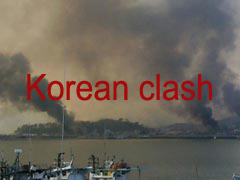S. Korea begins live-fire drill
During his candid and thorough talks with leaders of the two countries, Dai had urged the two sides to maintain calm and show restraint, conduct talks and engagement, and avoid any activity that could worsen the situation, Wang told the Security Council, adding that the Chinese Foreign Ministry had urgently summoned DPRK and ROK ambassadors to China recently, and reiterated China's stance and proposals.
|
Don't miss
|
People from the DPRK and the ROK and the international community strongly want to avoid escalation, and wish for dialogue rather than confrontation, and peace rather than war, Wang said.
China strongly urged the two sides on the Korean Peninsula to exercise maximum restraint, avoid armed conflict, place the safety of more than 70 million fellow citizens above everything else and attach utmost importance to the maintenance of regional peace and stability, he said.
China hopes all parties will adopt a responsible attitude and resolve issues through peaceful means, he added.
The situation highlights the necessity and urgency of holding emergency consultations among the heads of the six-party delegations, he said.
"Once again, China calls on all the parties concerned to return to the right track of dialogue and negotiations at an early date," he said.
U.S. UN ambassador Susan Rice said after the emergency meeting that "while we still are waiting for firm clear instructions from every capital. I think its safe to predict that the gaps that remain are unlikely to be bridged.
"We also outlined our position that it is important for the two sides to act in a fashion that promotes peace and security, " Rice told reporters.
"We have also spent much of today trying to discuss in the context of the Council how we might respond to the call of the Russian Federation for a Council press statement," she said.
Russian UN Ambassador Vitaly Churkin told reporters on Sunday that the Security Council members failed to reach an agreement on his proposal that UN Secretary-General Ban Ki-moon immediately sends a special representative to the Republic of Korea (ROK) and the Democratic People's Republic of Korea (DPRK) for consultations on how to settle the current crisis of the Korean Peninsula in a peaceful manner.
"That idea of the secretary-general appointing an envoy did receive considerable support, strong support I could say from a number of members of the Security Council. So I hope that idea can still be pursued," he said. "Because now we have a situation of very serious political tension and no game plan on the diplomatic side."
"We were not successful in bridging all the gaps," Churkin said.
"So even though this day in the Security Council, these two days in fact, yesterday and today which we spent in discussion among Council members, and this closed meeting of the Security Council where the two parties, the two Korean sides also had a chance to speak," Churkin said.
Each of the ambassadors of the ROK and the DPRK was allowed to speak for two minutes at the closed-door Council meeting, diplomatic sources said.
"I think most importantly (the two Korean sides) had a chance to listen to the messages of the members of the Security Council -- I'd like to think that this meeting of the Council will have an impact on the situation," Churkin said.
Churkin said on Saturday the situation on the Korean Peninsula "directly affects the national security interests of the Russian Federation." Russia shares border with the DPRK.
"We are seriously concerned about possible further escalation of tension on the Korean Peninsula," Churkin said. "We believe that the Security Council must send a restraining signal" to the DPRK and the ROK.
 0
0 







